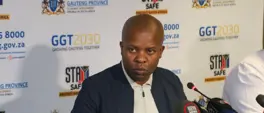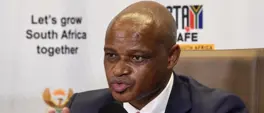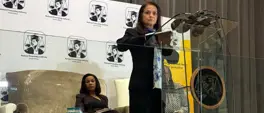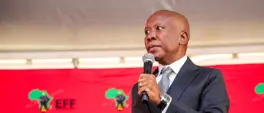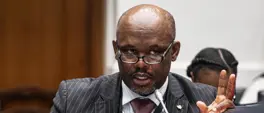From KwaZulu-Natal police commissioner Nhlanhla Mkhwanazi’s bombshell to the Madlanga Commission: A timeline of the police crisis
Orrin Singh
14 September 2025 | 9:57KwaZulu-Natal police commissioner Lieutenant-General Nhlanhla Mkhwanazi broke rank, when he stood before cameras on 6 July and delivered what many are calling the most damning indictment of corruption within the country's criminal justice system in recent years.
- Police inquiry
- Police Crisis
- KZN police commissioner Nhlanhla Mkhwanazi
- South African Police Service (SAPS)
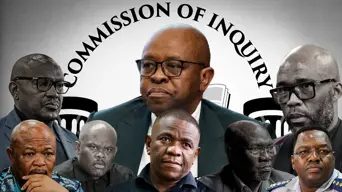
JOHANNESBURG - It was a breach of police protocol that sent shockwaves through South Africa's political establishment.
KwaZulu-Natal police commissioner Lieutenant-General Nhlanhla Mkhwanazi broke rank, when he stood before cameras on 6 July and delivered what many are calling the most damning indictment of corruption within the country's criminal justice system in recent years.
Mkhwanazi’s briefing to the media in Durban became a devastating exposé that triggered parliamentary debates, a presidential address, immense public scrutiny, and a cascade of political fallout that continues to reverberate through the corridors of power.
He alleged that police minister Senzo Mchunu interfered with sensitive police investigations and colluded with criminal syndicates to protect politically connected individuals from prosecution and claimed to have uncovered evidence of a vast criminal network involving politicians, senior police officers, correctional services officials, prosecutors, members of the judiciary, and businesspeople operating within Gauteng.
Central to Mkhwanazi' allegations was the controversial disbandment of the National Task Team on Political Killings (NTTPK), a specialised unit investigating political assassinations in KZN, and in recent the Eastern Cape.
MK Party supporters march in Pretoria in support of Nhlanhla Mkhwanazi
[WATCH] 'IPID probing me because I cleared CI boss' - KZN Police Commissioner Nhlanhla Mkhwanazi
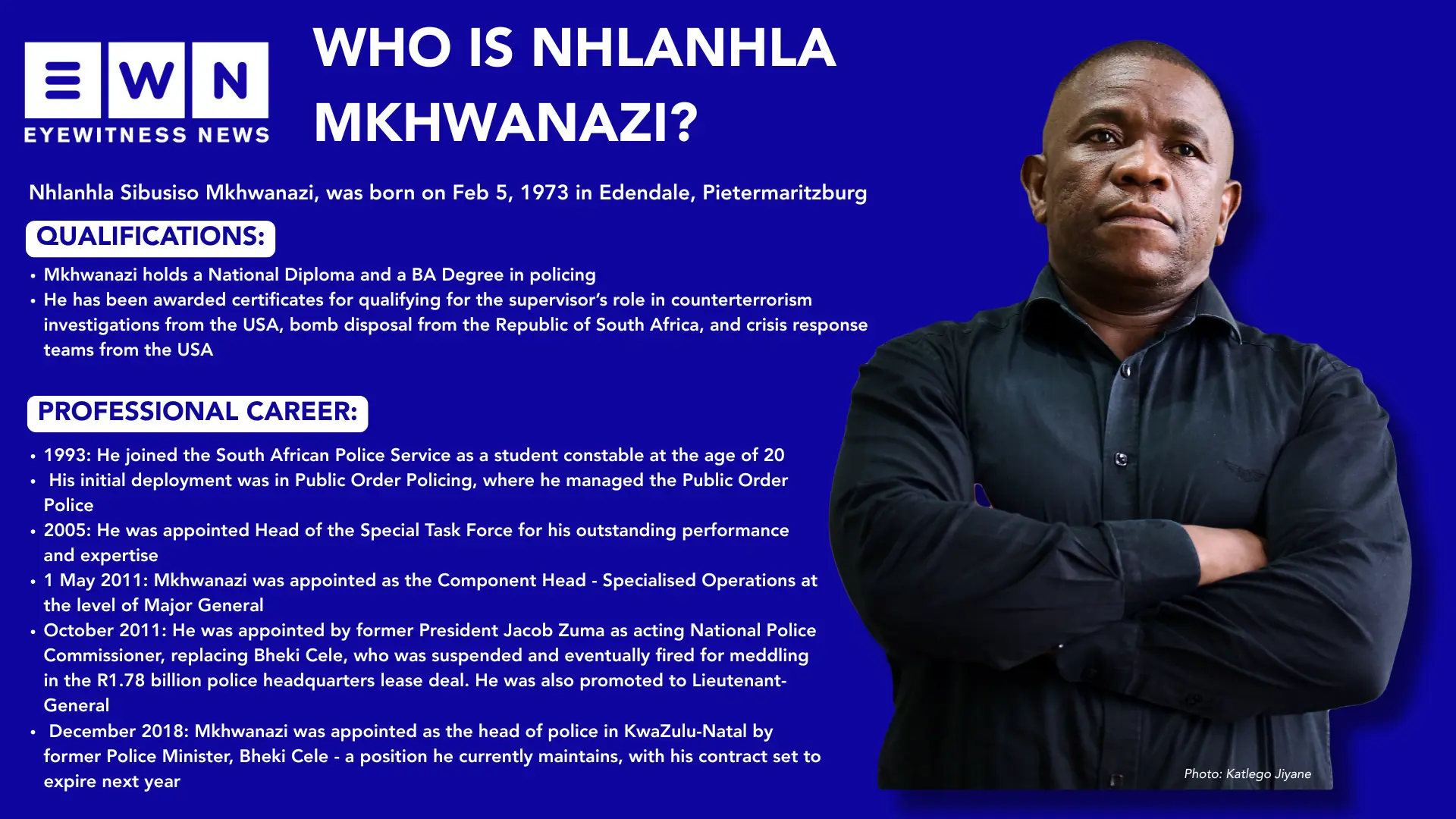
The letter that divided
On 31 December Mchunu penned a letter to the office of the national police commissioner, Fanie Masemola, for the disbandment of the NTTPK.
Mchunu’s reasoning at the time, according to an affidavit submitted by Masemola to the high court in Pretoria on 11 August, was based on his “observations that the further existence of the team is no longer required, nor is it adding value to policing in South Africa.”
Mchunu directed the team be immediately disestablished and required a preliminary report on 20 January, and a final closing report at a later date in the month.
At the time Masemola was on leave - and was only set to return on the 14 January.
Lieutenant General Tebello Mosikili, deputy national commissioner for policing, was appointed to act in his absence.
Masemola claims to have become aware of the letter on 2 January but claims to only have studied it comprehensively upon his return to work on 14 January.
On 3 January, a letter was sent from Masemola’s office to the office of Lieutenant-General ShadrackSibiya, deputy national commissioner for crime detection.
The letter directed Sibiya to accordingly communicate the deactivation to the relevant team (members of thePolitical Killings Task Team).
Mchunu insists he's never met alleged crime kingpin Vusimuzi 'Cat' Matlala
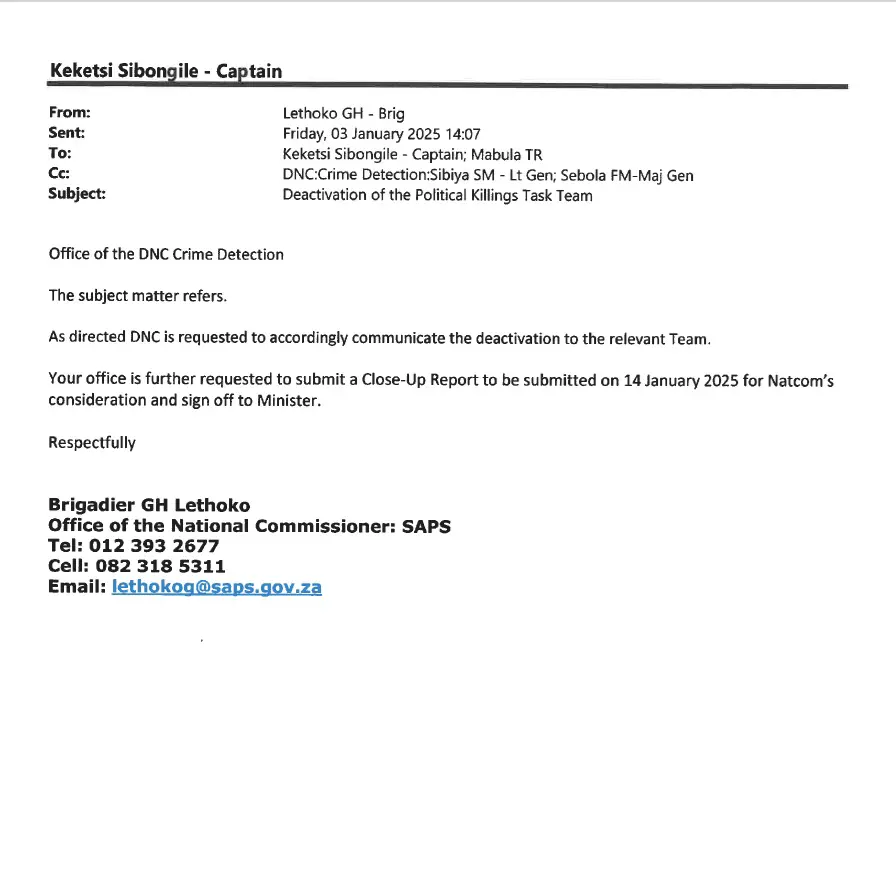
The Parliamentary bombshell
During a briefing in March to the portfolio committee on police in Parliament, Mkhwanazi revealed messages he received from Brown Mogotsi, a businessman from the North West - who is also believed to be a card-carrying ANC member. Mchunu and Masemola were also present in the meeting.
Mchunu admits knowing Brown Mogotsi after denying in Parliament
IN FULL | KZN Police Commissioner Mkhwanazi speaks in detail about 'Brown Mogotsi'
The messages from Mogotsi to Mkhwanazi date back to September 2024 - something KZN’s top cop revealed in detail to EWN during an interview in April.
In the same Parliamentary meeting Mchunu denied knowing Mogotsi.
Mkhwanazi made a point to emphasise decisions taken back in 2011 to not prosecute former crime intelligence head, Richard Mdluli.
Mkhwanazi, who was acting national police commissioner at the time, told Parliament that he, together with others, were ostracised within the organisation by former national police commissioner, Riah Phiyega, as they were seen as the driving force behind the attempt to prosecute Mdluli for corruption.
He claimed crime intelligence head Dumisani Khumalo, Masemola and himself were painted as the “bad ones” within SAPS, for merely “trying to do their jobs.”
Factionalism within SAPS
Crime expert and director of IRS Forensic Investigations, Chad Thomas, said factionalism within SAPS has existed for decades.
“Factionalism within SAPS dates back twenty-five years to the very first political appointment of Jackie Selebi as national police commissioner, who had no previous policing experience. Since then, we’ve seen political interference, which of course has created factionalism. Factionalism has created a fractured leadership, and that fractured leadership has now left us in a deficit of leadership. The police as it stands right now needs a complete overhaul in terms of its leadership.”
Lizette Lancaster, the manager of the Crime and Justice Information and Analysis Hub at the Institute for Security Studies, said factionalism within SAPS was evident and needed to be rooted out.
“The first way of dealing with the factionalism within SAPS or any other criminal justice system department, is to see how best to appoint the most experienced people with integrity. And this must follow a very transparent, merit based and competitive process, one by a panel of credible experts.”
A key focus of Mkhwanazi’s briefing was the 121 case dockets - under investigation by the NTTPK - which were taken away from them as directed by the Sibiya acting on the instruction of the Mchunu to disband the Task Team.
Mkhwanazi alleges this was done without the authority of Masemola.
The dockets were re-directed to Sibiya’s office on 26 March - on the same day he met with EWN to discuss his strained relations with Mkhwanazi.
During the interview Sibiya claims they’ve had differences but put them aside to ensure it doesn’t affect their work - adding that certain people were trying to link him and underworld figure Vusimuzi “Cat” Matalala.
Matalala had scored a R360-million police tender through his company Medicare24 - a contract Masemola cancelled on 13 May, a day before Matlala was arrested.
But while some cling to Mkhwanazi’s claims as the gospel truth, they remain allegations that are yet to be tested within the ambit of the law - with the Madlanga judicial commission of inquiry established by President Cyril Ramaphosa for this very purpose.
Among the key areas the commission seeks to investigate are allegations of systematic interference with police investigations, the deliberate obstruction of justice, and the protection of politically connected criminals through institutional manipulation.
It will be months before South Africans hear of the commission's outcomes - and even then, their findings are not binding and can only be made as recommendations to Ramaphosa, the office of the Chief Justice and speaker of the National Assembly.
Senior police sources claim there is more to Mkhwanazi’s allegations - as SAPS remains one of many pawns within the justice cluster on the political chess board.
Get the whole picture 💡
Take a look at the topic timeline for all related articles.

